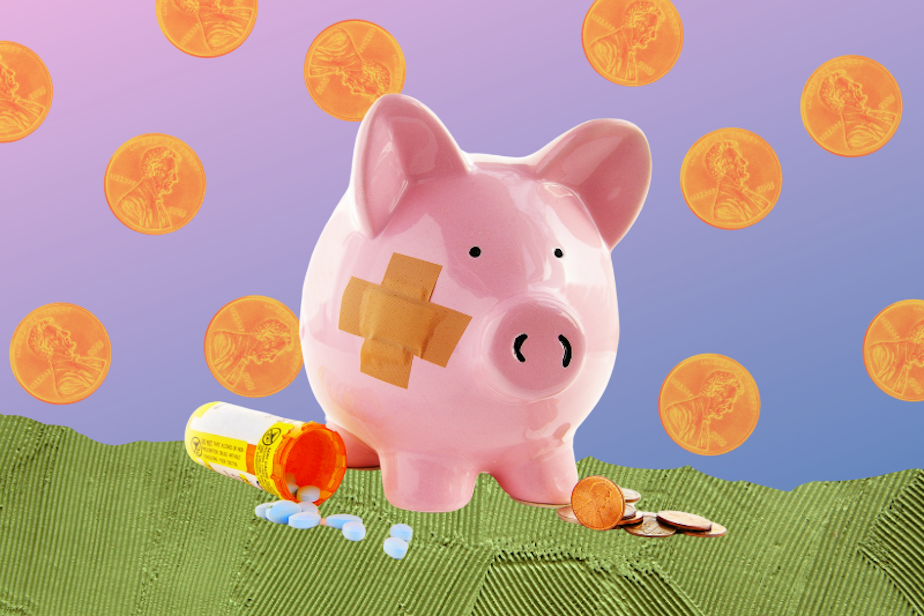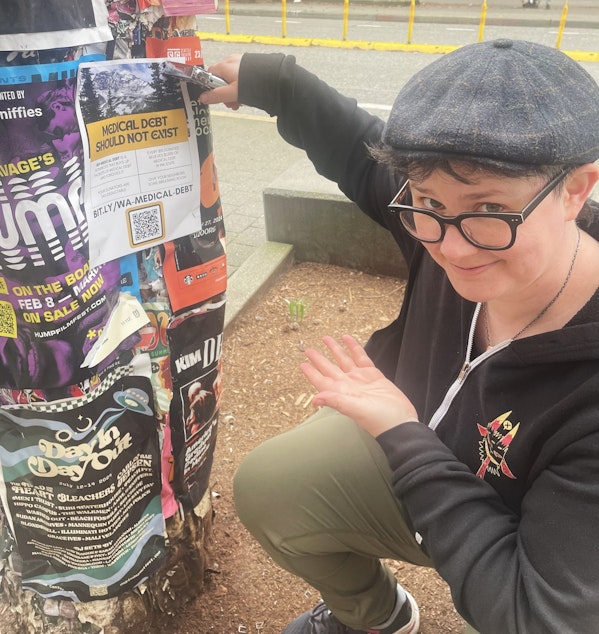With pennies on the dollar and surprise notices, this nonprofit clears Washingtonians' medical debt

Gail Blake of Spokane, Washington, knows the crushing weight of carrying medical debt. Blake, now 67 and retired, had accumulated hundreds of dollars worth of medical bills following frequent trips to the emergency room while uninsured.
“I'd been praying [because I was] so tired of being under this heavy burden,” she said. “Even though I was working at the time, I didn't know how I was going to get rid of this debt, 'cause everything was just still so tight.”
But one day, after years of stress over that debt, Blake unexpectedly received a letter from a group called RIP Medical Debt — a letter she said changed her life.
“I almost threw it away,” Blake said, because she saw the letters R-I-P, but her curiosity got the best of her. “So I opened it and you know, [it] was a fantastic surprise.”
The debt she'd carried for over a decade had been relieved.
Sponsored
“When that letter came … shucks. I was free. I was free! I couldn't believe it,” Blake said. “I was speechless. It [felt] like being set free from a prison.”
RIP Medical Debt, a national nonprofit based in Long Island City, New York, raises funding to pay off people’s medical debt — oftentimes without their prior knowledge. So far, the organization has paid off more than $11.9 billion worth of medical debt for roughly 7.5 million people since its inception in 2014, a spokesperson said.
Now RIP Medical Debt is partnering with a Seattle business owner to bolster its impact in Washington state, where it's already helped nearly 66,000 residents wipe out about $68.2 million worth of medical debt.
How it works
By buying medical debt in “bulk,” RIP Medical Debt is able to pay it off for an average of 1% of the total owed, according to Eva Stahl, vice president of public policy and program management for RIP Medical Debt. In other words, $1 could clear about $100 worth of debt.
Sponsored
In such a scenario, “the hospital's tried to collect on the debt, and they no longer can,” Stahl said, because people don’t have the money. So “it's put into the bad debt file and it is written off,” she added.
The way it works is RIP Medical Debt tells a health care provider it would like to buy that portfolio of debt, and offers to pay pennies on the dollar for it. But unlike debt collectors, who aim to turn a profit, RIP Medical Debt’s goal is to free people of their debt entirely.
“[We] send out letters to all those individuals and let them know that that debt is relieved,” Stahl said. “It's important for people that those debts actually are erased, so that they can have peace of mind and notification that they don't owe those debts.”
RELATED: A 'medical cost-sharing' plan left this minister to pay most of his $160,000 bill
Another perk: Recipients don’t owe taxes on this debt because it’s been canceled by a charity.
Sponsored
Stahl said in order to qualify for relief funded by RIP Medical Debt, a person must owe more than 5% of their income, or the debt must be at least 400% above their state’s poverty line, as defined by the U.S. Department of Health and Human Services.
'Robbing Peter to pay Paul'
Unlike consumer debt, medical debt is usually incurred unexpectedly — people don’t plan to get sick or hurt, and health care treatments and tests are often unavoidable and expensive.
Nationwide, Americans collectively owe at least $220 billion in medical debt; about $4.2 billion of that is owed in Washington state, according to the nonprofit health policy research group KFF. To put that into context, $4.2 billion could build at least two more Climate Pledge Arenas in Seattle.
People with disabilities, those with lower incomes, and people of color disproportionately carry medical debt, KFF says.
Sponsored
For many, unpaid medical bills can have long-lasting financial consequences. Such debt can impact your credit — particularly if you owe more than $500 and haven’t paid it off within a year, according to the credit reporting company Experian.
RELATED: As some medical debt disappears from Americans' credit reports, scores are rising
Moreover, carrying medical debt could negatively impact one's health.
“[Medical debt] also keeps people from returning to the doctor,” Stahl said. “If you are fearful of unpaid medical bills, or of accruing medical debt, you really don't want to take the step of picking up the phone and making the appointment for care that you need.”
For Blake’s part, things had gotten to the point where she had to decide whether to pay for her medications or other life necessities.
Sponsored
“You're just kind of left trying to rob Peter to pay Paul,” she said. “And that's what you do. And sometimes you can, and sometimes you can't.
'We've Got Us'
After facing large medical bills themselves, Seattle-based small business owner Anne Bean partnered with RIP Medical Debt to start a debt relief campaign, called We’ve Got Us, specifically for Washingtonians. Every dollar donated will relieve about $100 of medical debt.
“In 2021, I had a bizarre medical year,” Bean said. “I had a breast cancer scare. Also, probably one of the blood vessels near my spine was leaking blood. This took a lot of tests and a long time to figure out.”
Bean, who owns Emerald Comics Distro, said they maxed out two years' worth of out-of-pocket coverage on all their medical care.
“I'm currently still paying off a spinal angiogram that I got in early 2022,” Bean said, adding that before insurance, the cost of the angiogram was around $425,000.
“I have a few hundred dollars a month that I will be paying for a long time. For me, that's not life-ruining, but I recognize that for most people, it is either life-ruining or seriously difficult to manage,” they said.
To help relieve some of that pressure, Bean hopes the We’ve Got Us campaign can raise $20,000 to help relieve around $2 million of debt for Washingtonians by the time it ends on April 19.

“I think this is a great way to engage in community care,” Bean said. “This is a pretty concrete thing to do that can measurably give your community some breathing room.”
Groups like RIP Medical Debt are helpful to people whose debt is for sale, but there’s also help available before medical bills are up for collections.
The Washington State Attorney General's Office notes that state law requires hospitals to provide medical financial assistance to Washingtonians based on their income level — for both insured and uninsured patients.
RELATED: Hospitals may help foot your bill — but many people don’t know that
Most hospitals offer “charity care,” through which patients can receive income-based discounts or even bill forgiveness, according to Dollar For, a national nonprofit that helps patients learn to manage and get rid of medical debt. The Washington State Office of the Insurance Commissioner encourages anyone needing help with medical debt to visit dollarfor.org to find resources.
Stahl, with RIP Medical Debt, acknowledged that charitable medical debt relief programs aren’t a panacea for rising medical costs. But until systemic changes are made, organizations like hers will keep buying medical debt and surprising people like Gail Blake with the gift of a zero balance.
“I'll be thankful for the duration of my life,” Blake said, adding that her credit score shot up after having her medical debt paid off.
“They said it was over 700, and that’s close to 800,” she said.
“Girl, I went and got me a new car!”




